close 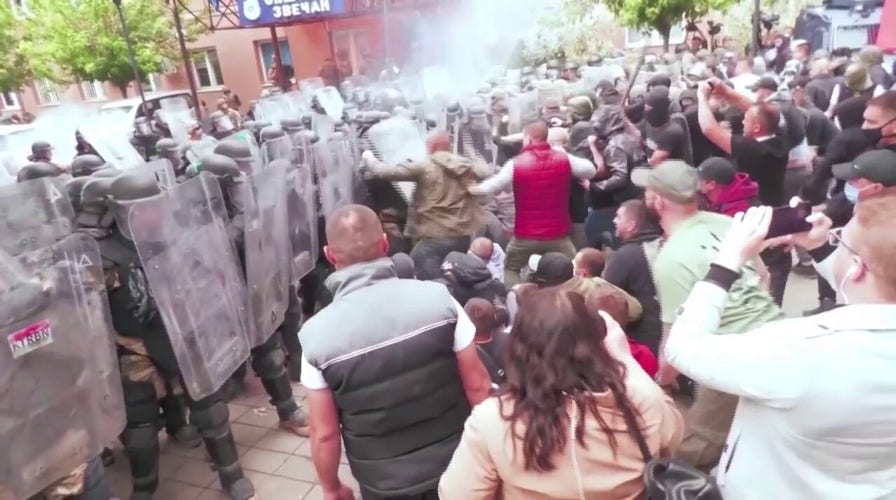
Fighting breaks out in Kosovo
Serious clashes broke out Monday between ethnic Serbs and NATO and Kosovo police forces. (Reuters)
U.S. Secretary of State Antony Blinken faced criticism from a close ally as ethnic tensions have once again flared in the Balkans.
Kosovo Prime Minister Albin Kurti took a shot at Blinken, who had criticized Kosovo’s government for “actions it took against the advice of the United States and Kosovo’s European partners,” according to a statement from Blinken.
Kurti didn’t shy away, telling The Guardian newspaper in an interview last week, “I think it’s not just unfair and wrong and hurtful but at the same time very naive.” He also said the comments were appeasing Serbian President Aleksandar Vucic.
SERBIA, CAUGHT BETWEEN EUROPE AND RUSSIA, COULD MOVE ONE STEP CLOSER TO NORMALIZING RELATIONS WITH KOSOVO
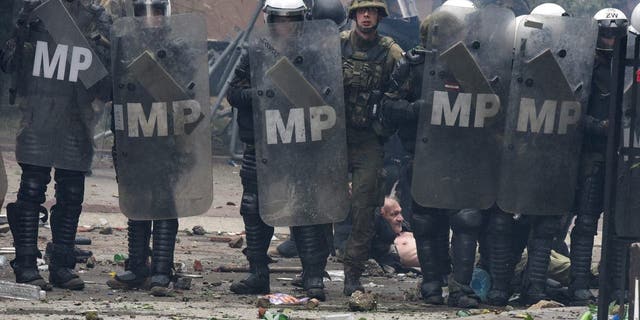
NATO Kosovo Force soldiers detain a protester at the entrance of the municipality office in the town of Zvecan, Kosovo, on May 29, 2023. (Reuters/Laura Hasani)
Kurti ignored a demand from Blinken to reverse course and refrain from actions that would inflame tensions. The prime minister said Kosovo police will stay in the northern Serb region, a move that the U.S. believes will not help defuse the situation. In response, the U.S. announced that it was canceling Kosovo’s participation in upcoming NATO military exercises.
Asked for comment on Kurti’s criticism, a State Department spokesperson referred Fox News Digital to Blinken’s comments in Norway on Thursday in which he said, “The escalation there and the actions taken there move both Kosovo and Serbia in the wrong direction because the answer that we’re looking for is de-escalation, avoiding any unilateral actions, and returning to this normalization process and the EU-led effort that is what promises both of them a future of integration in the Euro-Atlantic community,” Blinken said during his press conference in Oslo.
Blinken said the U.S. will oppose any actions that either country takes that would make EU integration a more distant prospect.
“We’ve been very clear in our concerns about some of the recent actions that were taken. We’ve said that directly to the leaders involved, including Prime Minister Kurti. And we’re looking for both to act responsibly going forward,” Blinken added.
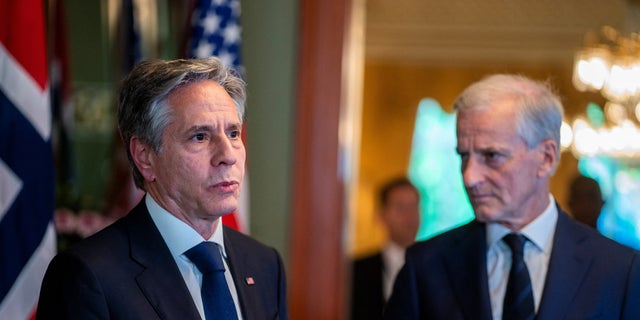
Secretary of State Antony Blinken, left, meets with Norwegian Prime Minister Jonas Gahr Store ahead of a NATO meeting in Oslo, Norway, on May 31, 2023. (NTB/Heiko Junge via Reuters)
French President Emmanuel Macron also waded in and directly blamed Kurti and Kosovo for the confrontation. With its rebuke of ally Kurti, the U.S. has been accused by some in diplomatic circles of taking the side of Vucic, who has been a close ally of Russian President Vladimir Putin.
HISTORICAL RUSSIAN ALLY SNUBS PUTIN IN GROWING SHIFT TO EUROPEAN UNION
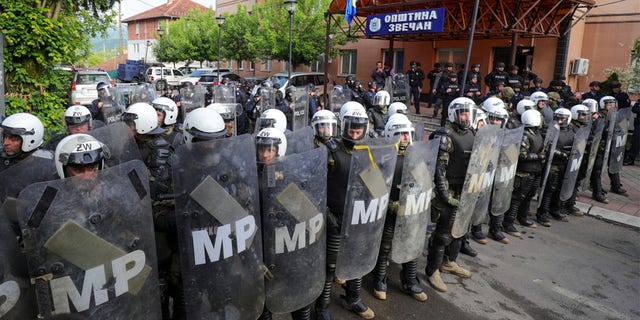
Polish soldiers, part of the peacekeeping mission in Kosovo, and Kosovo Force guard a municipal building in the town of Zvecan on May 29, 2023. (AP Photo/Bojan Slavkovic)
“I do not think that the latest statements from the United States or France necessarily mean that they are siding with Vucic as much as they are merely critical of the Kurti government’s decision to send the mayors to their offices and insist that they have legitimacy to govern, knowing all too well that this is likely to spark tensions,” Helena Ivanov, associate fellow at the Henry Jackson Society, told Fox News Digital.
“Generally, I think that the West just wants things to stay calm and will criticize any moves that are likely to spark tensions – thus the critical tone towards Kosovo,” Ivanov added.
RUSSIAN INFLUENCE PEDDLING ADDS TO FEARS AFTER ELECTION OF UNTESTED PRESIDENT IN EUROPEAN NATION
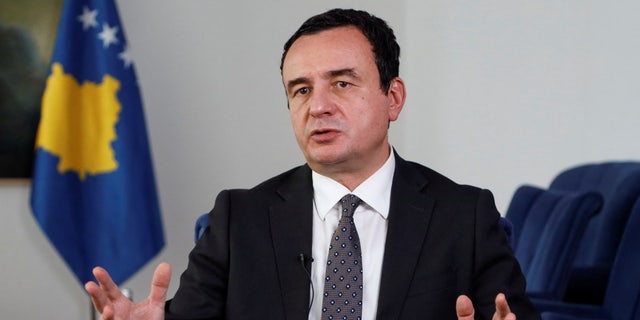
Kosovo Prime Minister Albin Kurti speaks during an interview with Reuters at his office in Pristina, Kosovo, on Aug. 10, 2022. (Reuters/Fedja Grulovic)
Facing mounting pressure from the Europeans, the presidents of Serbia and Kosovo met in Moldova to discuss ways of lowering tensions on Thursday. Reuters reported that following her meeting with Vucic, Kosovo President Vjosa Osmani accused him of “whining and complaining and … not telling the truth.”
Osmani, however, did offer some hope by saying that Kosovo could hold new elections in the north with Serb participation if they were triggered legally. Vucic left without making comments to the media, according to Reuters.
Violence erupted after ethnic Albanian mayors took office in the north of Kosovo, a predominantly Serb majority enclave of Kosovo, following April elections that were boycotted by Serbian political parties and their supporters. The U.S. urged Kurti not to hold the elections, fearing the outcome would be illegitimate in the eyes of local Serbs. The boycott resulted in an extremely low turnout of 3.5%, leading many in the West to claim the elections were indeed illegitimate.
Serbs attempted to block the ethnic Albanian mayors from entering their offices, and Kosovar police responded by firing tear gas, which escalated tensions. More violence ensued when Serbs clashed with Kosovo police and NATO peacekeeping troops. Serbia, for its part, responded by sending troops to the border with Kosovo and put its armed forces on high alert.
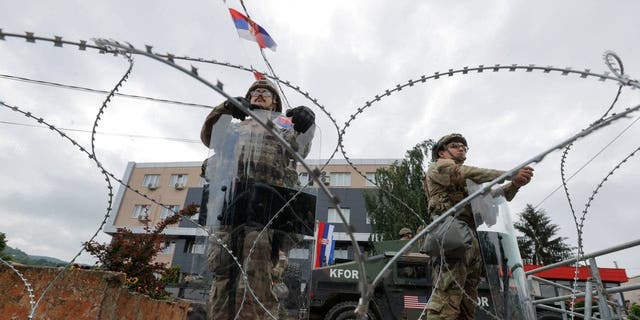
U.S. KFOR soldiers stand guard in front of the municipality office in the town of Leposavic, Kosovo, on May 29, 2023. (Reuters/Valdrin Xhemaj)
“NATO strongly condemns the unprovoked attacks against KFOR troops in northern Kosovo, which have led to a number of them being injured. Such attacks are totally unacceptable,” reads a statement from a NATO spokesperson.
Eleven Italian soldiers and 19 Hungarian troops sustained multiple injuries, “including fractures and burns from improvised explosive incendiary devices,” and three Hungarian soldiers were injured from firearms, according to a Kosovo Force (KFOR) statement.
Kurti also blamed Vucic for stoking tensions and inflaming what he called a “fascist mob” that attacked NATO forces.
US ACCUSED OF RETREATING FROM NATO ALLY ALBANIA AS RUSSIA LOOKS TO GROW REGIONAL INFLUENCE
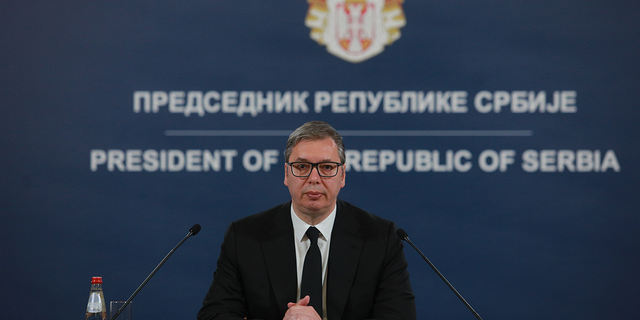
Serbian President Aleksandar Vucic holds a news conference on the school shooting that claimed the lives of at least nine people in Belgrade, Serbia, on May 3, 2023. (Milos Miskov/Anadolu Agency via Getty Images)
While 92% of Kosovo is ethnic Albanian, Serbs in the north are still loyal to Belgrade and refuse to accept Kosovo’s 2008 unilateral declaration of independence.
Conflict between Serbia and Kosovo following the 1999 war is unresolved and is a roadblock to their further European integration. Kosovo was a former province of Serbia and was once integrated within the nation of Yugoslavia. NATO led a bombing campaign against Yugoslavia in 1999, which comprised Serbia and Montenegro, to defend Kosovo’s ethnic Albanians against violence from Belgrade. Nearly a decade later, Kosovo declared independence from Serbia in 2008, and Serbia refuses to recognize their independence.
CLICK HERE TO GET THE FOX NEWS APP
The renewed violence is another roadblock in the EU-facilitated process to normalize relations between Serbia and Kosovo, which has been ongoing for years. The EU has made clear that normalizing relations is a necessary and required step for joining the bloc.
“Our message both to Belgrade and to Pristina is that they have to engage in good faith in the EU-facilitated dialogue,” NATO Secretary General Jens Stoltenberg said at a press conference on Thursday. “That is the only path to peace, but at the same time, NATO has responsibility to ensure stability in Kosovo, and that is reason why we have been there for many years and why we now are increasing our presence in the region.”
Reuters contributed to this story.
